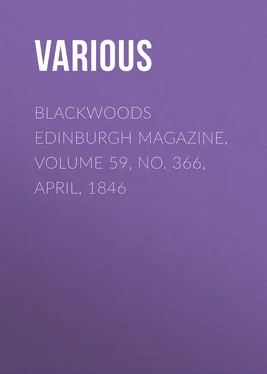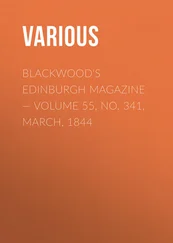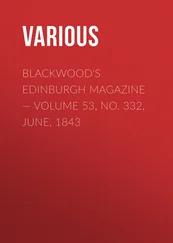Various - Blackwoods Edinburgh Magazine, Volume 59, No. 366, April, 1846
Здесь есть возможность читать онлайн «Various - Blackwoods Edinburgh Magazine, Volume 59, No. 366, April, 1846» — ознакомительный отрывок электронной книги совершенно бесплатно, а после прочтения отрывка купить полную версию. В некоторых случаях можно слушать аудио, скачать через торрент в формате fb2 и присутствует краткое содержание. Жанр: periodic, foreign_edu, Путешествия и география, на английском языке. Описание произведения, (предисловие) а так же отзывы посетителей доступны на портале библиотеки ЛибКат.
- Название:Blackwoods Edinburgh Magazine, Volume 59, No. 366, April, 1846
- Автор:
- Жанр:
- Год:неизвестен
- ISBN:нет данных
- Рейтинг книги:5 / 5. Голосов: 1
-
Избранное:Добавить в избранное
- Отзывы:
-
Ваша оценка:
- 100
- 1
- 2
- 3
- 4
- 5
Blackwoods Edinburgh Magazine, Volume 59, No. 366, April, 1846: краткое содержание, описание и аннотация
Предлагаем к чтению аннотацию, описание, краткое содержание или предисловие (зависит от того, что написал сам автор книги «Blackwoods Edinburgh Magazine, Volume 59, No. 366, April, 1846»). Если вы не нашли необходимую информацию о книге — напишите в комментариях, мы постараемся отыскать её.
Blackwoods Edinburgh Magazine, Volume 59, No. 366, April, 1846 — читать онлайн ознакомительный отрывок
Ниже представлен текст книги, разбитый по страницам. Система сохранения места последней прочитанной страницы, позволяет с удобством читать онлайн бесплатно книгу «Blackwoods Edinburgh Magazine, Volume 59, No. 366, April, 1846», без необходимости каждый раз заново искать на чём Вы остановились. Поставьте закладку, и сможете в любой момент перейти на страницу, на которой закончили чтение.
Интервал:
Закладка:
Various
Blackwoods Edinburgh Magazine, Volume 59, No. 366, April, 1846
THE MARQUESS WELLESLEY
The revival of noble recollections, the record of great actions, and the history of memorable times, form one of the highest services which a writer can offer to his country. They mould the national Character, and upon the character depends the greatness of every nation. Why have the mighty kingdoms of the East perished without either general reverence or personal value, but from the absence of Character in their people; while Greece in all its ancient periods, and Rome throughout the days of its republic, are still the objects of classic interest, of general homage, and of generous emulation, among all the nobler spirits of the world? We pass over the records of Oriental empire as we pass over the ruins of their capitals; we find nothing but masses of wreck, unwieldy heaps of what once, perhaps, was symmetry and beauty; fragments of vast piles, which once exhibited the lavish grandeur of the monarch, or the colossal labour of the people; but all now mouldered and melted down. The mass essentially wants the interest of individuality. A nation sleeps below, and the last memorial of its being is a vast but shapeless mound of clay.
Greece, Rome, and England give us that individuality in its full interest. In their annals, we walk through a gallery of portraits; the forms "as they lived," every feature distinct, every attitude preserved, even the slight accidents of costume and circumstance placed before the eye with almost living accuracy. Plutarch's Lives is by far the most important work of ancient literature; from this exhibition of the force, dignity, and energy attainable by human character. No man of intelligence can read its pages without forming a higher conception of the capabilities of human nature; and thus, to a certain extent, kindling in himself a spirit of enterprise.
It is in this sense that we attach a value to every work which gives us the biography of a distinguished public character. Its most imperfect performance at least shows us what is to be done by the vigorous resolution of a vigorous mind; it marks the path by which that mind rose to eminence; and by showing us the difficulties through which its subject was compelled to struggle, and the success by which its gallant perseverance was crowned, at once teaches the young aspirant to struggle with the difficulties of his own career, and cheers him with the prospect of ultimate triumph.
Of the general execution of these volumes, we do not desire to speak. They have been professedly undertaken as a matter of authorship. We cannot discover that the author has had any suggestion on the subject from the family of the late Marquess, nor that he has had access to any documents hitherto reserved from the public. He fairly enough states, that he derived his materials largely from the British Museum, and from other sources common to the reader. His politics, too, will not stand the test of grave enquiry. He adopts popular opinions without consideration, and often panegyrizes where censure would be more justly bestowed than praise. But we have no idea of disregarding the labour which such a work must have demanded; or of regretting that the author has given to the country the most exact and intelligent biography which he had the means of giving.
The Wellesley family, rendered so illustrious in our time, is of remote origin, deriving its name from the manor of Welles-leigh, in the county of Somerset, where the family had removed shortly after the Norman invasion. A record in the library of Trinity College, Dublin, traces the line up to A.D. 1239, to Michael de Wellesleigh. The family seem to have held high rank or court-favour in the reign of Henry I., for they obtained the "grand serjeanty" of all the country east of the river Perrot, as far as Bristol Bridge; and there is a tradition, that one of the family was standard-bearer to Henry I. in the Irish invasion. In England, the family subsequently perished; the estates passing, by a daughter, into other families.
The Irish branch survived in Sir William de Wellesley, who was summoned to Parliament as a baron, and had a grant by patent, from Edward III., of the castle of Kildare. In the fifteenth century, the family obtained the Castle of Dangan by an heiress. The de was subsequently dropped from the family name, and the name itself abridged into Wesley – an abbreviation which subsisted down to the immediate predecessor of the subject of this memoir; or, if we are to rely on the journals of the Irish Parliament, it remained later still. For in 1790 we find the late Lord Maryborough there registered as Wesley (Pole,) and even the Duke is registered, as member for the borough of Trim, as the Honourable Arthur Wesley .
Richard Colley Wesley, the grandfather of the Marquess, having succeeded to the family estate by the death of his cousin, was in 1746 created a peer. He was succeeded by his son Garret, who was advanced to the dignities of Viscount Wellesley of Dangan Castle, county Meath, and Earl of Mornington. He was a privy councillor in Ireland, and custos rotulorum of the county of Meath. He married Anne, eldest daughter of Arthur Hill Trevor, first Viscount Duncannon, by whom he had six sons and two daughters.
The Earl was a man of accomplished tastes; he had travelled, adopted dilettante habits, and expended more money in the decoration of his mansion and demesne than his fortune could well bear. But he would have been eminent if he had been compelled to make music his profession; his glee of "Here, in cool grot and mossy cell," has no rival in English composition for the exquisite feeling of the music, the fine adaptation of its harmony to the language, and the general beauty, elegance, and power of expression. He died on the 22d of May 1781.
Richard Colley Wellesley, afterwards the Marquess Wellesley, was born on the 20th of June 1760, in Ireland. At the age of eleven he was sent to Eton, under the care of the Rev. Jonathan Davis, afterwards head-master and provost of Eton. He soon distinguished himself by the facility and elegance of his Latin versification. He was sent to Oxford, and matriculated as a nobleman at Christ Church, in December 1778. In his second year at the college, he gained the Latin verse prize on the death of Captain Cook. His tutor was Dr William Jackson, afterwards Bishop of Oxford. In 1781, on the death of his father the Earl of Mornington, the young lord was called away to superintend the family affairs in Ireland, without taking his degree. On his coming of age, which was in the ensuing year, his first act was to take upon himself the debts of his father, who had left the family estates much embarrassed. His mother, Lady Mornington, survived, and was a woman of remarkable intelligence and force of understanding. To her care chiefly was entrusted the education of her children; and from the ability of the mother, as has been often remarked in the instance of eminent men, was probably derived the talent which has distinguished her memorable family. At the period of their father's death, the brothers and sisters of the young Earl were, William Wellesley Pole, (afterwards Lord Maryborough,) aged eighteen; Anne, (afterwards married to Henry, son of Lord Southampton,) aged thirteen; Arthur, (the Duke of Wellington,) aged twelve; Gerald Valerian, (prebendary of Durham,) aged ten; Mary Elizabeth, (Lady Culling Smith,) aged nine; and Henry, (Lord Cowley,) eight years old.
The period at which the young Earl took his seat in the Irish House of Lords was one of remarkable anxiety. The success of the American revolt had filled the popular mind with dreams of revolution. The success of opposition in the Irish Parliament had fixed the national eyes upon the legislature; and the power actually on foot in the volunteer force of Ireland, tempted the populace to extravagant hopes of national independence and a separation from England, equally forbidden by sound policy and by the nature of things.
Читать дальшеИнтервал:
Закладка:
Похожие книги на «Blackwoods Edinburgh Magazine, Volume 59, No. 366, April, 1846»
Представляем Вашему вниманию похожие книги на «Blackwoods Edinburgh Magazine, Volume 59, No. 366, April, 1846» списком для выбора. Мы отобрали схожую по названию и смыслу литературу в надежде предоставить читателям больше вариантов отыскать новые, интересные, ещё непрочитанные произведения.
Обсуждение, отзывы о книге «Blackwoods Edinburgh Magazine, Volume 59, No. 366, April, 1846» и просто собственные мнения читателей. Оставьте ваши комментарии, напишите, что Вы думаете о произведении, его смысле или главных героях. Укажите что конкретно понравилось, а что нет, и почему Вы так считаете.












